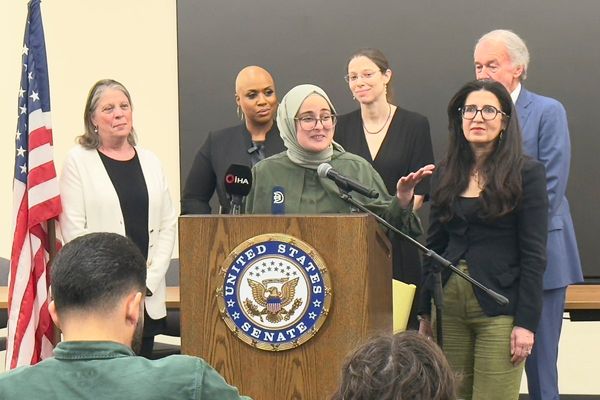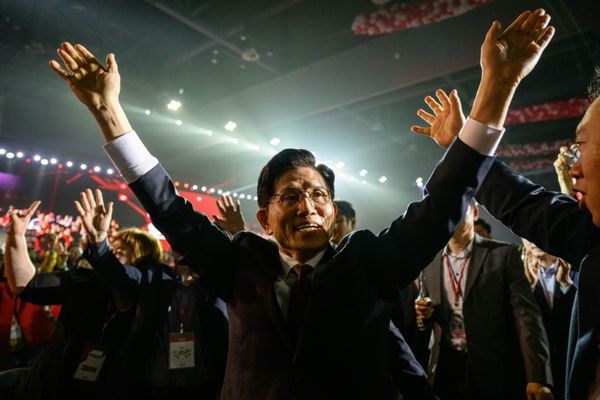
Good morning! The invitation to Buckingham Palace has paid off and the UK has become the first country to get a coveted trade deal with the United States since Donald Trump became president and plunged the global economy into chaos.
After Rachel Reeves came home empty handed from her trip to Washington DC last month, there had been fears that the UK would languish at the back of the line of countries queueing up before Trump – and to use the president’s words, “kissing my ass” – to try to secure concessions from the sweeping tariffs he inflicted on the world shortly after taking office.
In the end, the efforts of the UK’s negotiating team reaped results and at an exuberant press conference yesterday, Donald Trump and Keir Starmer congratulated each other on the “terrific” and “historic” deal that they had struck in record time.
Under the deal, the US will remove the 25% tariff on UK steel and aluminium and cut the rate on most car exports from 27.5% to 10%. In return, the UK government will remove the tariff on ethanol for US goods and agree on reciprocal market access for beef products.
But underneath all the celebratory rhetoric, how significant is this deal and what will be the impact on the UK economy? I talked to the Guardian’s economics editor Heather Stewart to dig into the details.
Five big stories
Papacy | Robert Prevost, the first US cleric to lead the Roman Catholic church, has said “evil will not prevail” as he addressed a crowd of 100,000 pilgrims and tourists in his first speech as Pope Leo XIV from the central balcony of St Peter’s Basilica. Read more on the new pope.
Kashmir crisis | India claimed to have thwarted retaliatory missile and drone strikes launched by Pakistan that attempted to hit sites in Indian-administered Kashmir, Punjab and Rajasthan.
Labour | More than 40 Labour MPs have written to the prime minister warning him that planned disability cuts are “impossible to support” and have called for a pause and change in direction. New MPs and veterans from the left and right of the party are setting up for the biggest rebellion of Keir Starmer’s premiership.
Gender | A cross-party committee of MPs has written to the UK’s equalities watchdog to seek assurances that its guidance on how organisations interpret the landmark supreme court ruling on gender issues does not ignore the needs of transgender people.
UK news | A woman has been cleared of illegally terminating a pregnancy after taking abortion pills during lockdown. Nicola Packer, 45, took the pills at home in November 2020. She had been prescribed mifepristone and misoprostol after a remote consultation.
In depth: Will the UK-US trade deal put Britain on the road to prosperity?
Since Brexit, striking a trade deal with the US has been considered the holy grail of UK trade policy.
The US is a vital trading partner for the UK, with imports from and exports to the world’s largest economy accounting for over £300bn – almost £1 in every £6 of all UK trade around the world.
Keir Starmer is framing this deal as a huge victory for both his government and the UK. Supporters will say the deal is an exoneration of his approach to dealing with Donald Trump, which has seen Starmer heap praise on Trump’s statesmanship, hand out an invite to meet the king live on TV, and lobby for Trump’s Scottish golf course to be made the host of the Open golf championship.
Yet with the global economy faltering and the impact of the Trump tariffs starting to sink in, the question remains whether this deal will change much for the UK’s economic prospects in the long term.
***
What is actually in the deal?
Trump is framing this deal a vindication of his economic policies and the UK will not get any relief from the 10% baseline tariffs imposed on all goods exported to the US.
However, the US will remove tariffs on British steel and aluminium exports, one of the UK’s key aims while negotiating. It’s also good news for the Britain’s beleaguered automotive industry, which will see the rate on most cars exported to the US slashed from 27.5% to 10%. In response, share prices of the Aston Martin Lagonda and jet engine maker Rolls-Royce have already risen.
Although the US government is heralding the UK’s agreement to offer reciprocal market access on beef as a big win for US farmers, none of the government’s “red lines” on conceding to lowering food standards on imports were crossed. Even though the UK is opening market access for US beef products, the government insists it won’t have to accept meat that falls below domestic welfare or safety standards.
Heather says it is also notable what is missing from the deal – it will have come as a surprise that Britain did not budge on its digital services tax despite US pressure to do so. It is also not clear from the deal whether the UK will be given preferential treatment in future tariffs on the film industry or pharmaceuticals.
***
How ‘full and comprehensive’ is the deal really?
Heather says that despite all the pomp and bluster, and Trump’s claims that this is a “full and comprehensive” deal, there isn’t actually a huge amount in there.
The main point is that the UK has managed to carve out some relief for the steel and car industries and avoid any major concessions that would cause a serious political headache, and the US has been allowed to claim victory in its America First tariff wars.
“We can expect the government to say that they managed to achieve what successive Conservative prime ministers failed to do in striking a deal but that is a bit disingenuous because they were after a comprehensive trade agreement and this a really limited trade deal designed to mitigate the damage of the Trump tariffs,” she says.
There is a big difference between trade deals and trade agreements: trade deals are usually short-term and limited while trade agreements are broad based and long term. As Andrew Sparrow the Guardian’s live blog editor wrote: “A big India-style agreement, this is not.”
***
Is this a genuine win for the UK?
Coming hot on the heels of the trade deal with India announced last week and ahead of a EU/UK Summit on the 19 May, the government says the deal with the US shows it is delivering and building momentum towards its promises on economic growth.
However, for Heather, the fact that we were the first across the line is less to do with our crack negotiating skills and more to do with the fact that Trump’s main complaint over trading terms lies elsewhere.
“In Trump’s mind, if you have a trade deficit you’re being cheated in some way and so he’s fixated on the EU and China which he feels are somehow pulling a fast one on the US,” she says.
“We don’t have this deficit, largely because we’ve hollowed out our domestic manufacturing industry, so ours would be one of the simpler trade deals to agree because there are likely to have been less sticking points.”
Heather says that although the UK actually didn’t give away that much, it is still in a worse position than it was just a few months ago in terms of trading arrangements with one of our most important partners.
It is, she says, less a blueprint for increasing prosperous trading arrangements and more an attempt to roll back some of the damage done by Trump’s America First economic policies.
“I think you can frame this not so much as a big win but as a big relief, especially for those sectors who were really on the ropes such as car manufacturing,” says Heather.
“It’s significant that Starmer held his press conference surrounded by car workers because he wants to say, we did this to protect jobs and protect our industry. It’s also a win that they haven’t given away anything that will compromise their dealings with the EU. But I think in general this deal is like the school bully giving some but not all of your lunch money back.”
***
What is in it for the US?
It’s also worth noting that despite Trump and his entourage bragging that today proved him to be single-handedly reworking the dynamics of global trade, the US needed this deal to happen almost as much as the UK.
Trump’s pitch to the American public is that he’s a master deal-maker and reliable custodian of the US economy and his polling – both personally and in terms of his economic policies – is tanking.
The White House needed an off-ramp from Trump’s global tariff fallout and this deal could provide just that; it will signal to other trading partners that the administration is stepping away from a war footing towards a desire to forge more normal bilateral trade relationships.
“The markets will respond positively to this deal because what Trump has shown is that he’s willing to negotiate if you give him something and accept the 10% tariff,” says Heather. “It’s a roadmap for other countries to follow.”
***
What is the potential impact of the deal on the UK economy?
Heather says that the deal itself is unlikely to solve the Starmer government’s economic woes. Trump’s entire tariff policy, including a projected slowdown in global economic growth, is likely to shave just 0.3% off GDP in three years’ time.
“It’s very important to have this piece of good news to take to the public and now that the Bank of England has cut interest rates they’re going to have positive headlines about people’s mortgages going down and this deal being done and that will help boost consumer and business confidence,” says Heather. “But in terms of the broader economic impact this deal is really quite small.”
Heather says that deal or no deal, Reeves is facing the damaging prospect of breaking her own fiscal promises and having to decide whether to raise taxes or cut public spending to try to make up the shortfall. With last week’s dire local election results for her government, some of her economic decisions are also proving hugely unpopular.
In other words, the chancellor has bigger problems than this limited trade deal can fix.
Pope of the States: Leo XIV starts his first day as pontiff
At just after 5pm last night, white smoke from the Vatican signalled that the conclave was over and a new papacy had begun. More than 100,000 pilgrims and tourists celebrated in St Peter’s Square as it was announced that 69-year-old US cardinal Robert Francis Prevost had been elected as Pope Leo XIV. Appearing in his papal robes, the new pope spoke words of peace to the crowd below who roared back their approval. Here are some key pieces to understand more about Pope Leo what his election will mean for the Catholic church.
In this piece, Sam Jones profiles the new moderate and good-humoured American pope
In this explainer, Harriet Sherwood sets out the challenges mounting up in the papal in-tray
Jenna Amatulli and Leigh Giangreco report from Pope Leo’s home town of Chicago about reactions to his election
What else we’ve been reading
Class, writes Larry Elliot in his column, remains a defining feature of British politics. And until Labour makes a meaningful difference to inequality, Reform will continue to be a thorn in its side. “Labour has to fix the economy – because while Britain’s cultural divide is unlikely ever to be healed, a rising tide lifts all boats,” he writes. Charlie Lindlar, acting deputy editor, newsletters
When battle-hardened foreign correspondent Lyse Doucet says she has to turn off the news, you know things are bad. Michael Savage interviews seasoned broadcasters on why even they are tuning out of the news cycle and what it means for journalism. Annie
Ahead of the singer’s 50th birthday, Lauryn Hill is the subject of this week’s ranked feature. Alexis Petridis picks the top 20 songs from her storied, influential back catalogue. Charlie
Nicolas Cage answers Guardian readers’ questions and takes us on a wild ride through pickled eggs, Terry Wogan and being mistaken for himself. Annie
The Grand Theft Auto series is known for its cynical humour and popcorn movie violence. But GTA VI, set for release next May, looks to be trying its hand at something new, Keith Stuart writes: a Bonnie and Clyde-like love story. Charlie
Sport
Football | Mason Mount scored twice, including one from just inside the Athletic Bilbao half, as Manchester United won 4-1 at home and 7-1 on aggregate to reach the Europa League final. Kiernan Dewsbury-Hall’s goal eased Chelsea to a 1-0 victory against Djurgården as they progressed 5-1 on aggregate to reach the Europa Conference League final.
Rugby | Henry Pollock has been included in the British & Irish Lions squad to tour Australia this summer, capping a remarkable rise for the Northampton back-rower, but there is no place for Owen Farrell or another former England captain Jamie George.
Football | Salford City have been taken over by a nine-member consortium headed by Gary Neville and David Beckham, who has said the ambition is to take the League Two club into the Premier League.
The front pages
“Evil will not prevail’:first US pope vows to build bridges” says the Guardian while the Metro says “Holy smoke … that was quick!”. Leo gets a picture slot on most fronts, one way or another, but is usually not the news lead. “UK ‘shafted’ by Starmer’s US trade deal” – that’s the Express parroting Kemi Badenoch, while the Times has “PM hails ‘historic’ deal with US”. “US trade deal made by Brexit” – the Mail also calls it a “Champions League ambush” in that Trump rang up Starmer during the Arsenal game. “PM hands US ‘veto’ on China deals” – the Telegraph gets into details. “UK wins global race to shake off worst Trump trade tariffs” is the i’s takeaway, as it is the FT’s: “Starmer seals first US trade deal since start of Trump”. “Honour their legacy” is the king’s VE Day message in the Mirror, while the pope waves from a puff box next to the masthead.
Something for the weekend
Our critics’ roundup of the best things to watch, read, play and listen to right now
Music
PinkPantheress: Fancy That | ★★★★☆
PinkPantheress’s bricolage approach to songwriting is fairly obviously that of someone raised with streaming’s decontextualised smorgasbord as their primary source of music. You can hear it in the way she leaps from one source to another, unburdened by considerations of genre or longstanding notions of cool. There’s something infectious and gleeful about the way she stitches together her disparate influences. But her real skill lies in her ability to imprint her own identity on the results. The music on Fancy That feels simultaneously boiled down yet packed with ideas, fleeting but not lacking, familiar but fresh, focused less on making grand statements than with immediacy and unforced fun: all perennially good things for pop music to be. Alexis Petridis
Film
Ocean with David Attenborough | ★★★★★
A visual marvel like all his work, governed by his own matchless authority and striking a steady tonal balance between warning and hope, David Attenborough’s new film about the oceans is absorbing and compelling. He makes a passionate case against the ruin caused by industrial overfishing and the sinister mega-trawlers which roam everywhere, brutally and wastefully hoovering up fish populations of which the majority is often simply thrown away. As he arrives at his 99th birthday, Sir David presents this new documentary in the context of his own remarkable life and career, studying and thinking about the oceans as the last part of the world to be fully understood and also, perhaps, the last part to be exploited – and despoiled. Peter Bradshaw
TV
Untold: Shooting Guards | ★★★★☆
Elite sport has millions of stories about kids who didn’t quite make it, but the bigger tragedy is the young adult who gets to the big leagues then throws it all away. The reliable US documentary strand Untold has found numerous variations on this sad old story over the years, and it’s turned up a devastating one in Shooting Guards, which tracks the parallel lives of basketball pros Gilbert Arenas and Javaris Crittenton. When Crittenton wades into a minor argument about borrowed money on a flight home from an away fixture, Arenas spies a chance for a wind-up. This leads to the incident that will define their lives. Untold: Shooting Guards sensitively examines the ruthless cruelties of top-level sport, and a society where some lonely, angry young men seem born to lose – even if they really should be winners. Jack Seale
The Upside
A bit of good news to remind you that the world’s not all bad
The Channel Islands were occupied by German forces for five years during the second world war and as they mark 80 years since liberation you can take a journey into the past and explore the wartime landmarks reclaimed for the modern age.
Through tours and museum exhibits, visitors can gain insight into the islanders’ resilience, the ethical dilemmas faced under occupation, and the forced labour behind Nazi fortifications.
Jersey manages to strike a balance between remembrance and practical reuse with an underground hospital repurposed into a museum, abandoned bunkers turned into tourist attractions, surf schools, cafes and seafood markets.
Bored at work?
And finally, the Guardian’s puzzles are here to keep you entertained throughout the day. Until tomorrow.







